Mary Ruth Liquid Probiotic Review (Tried For 30 Days)
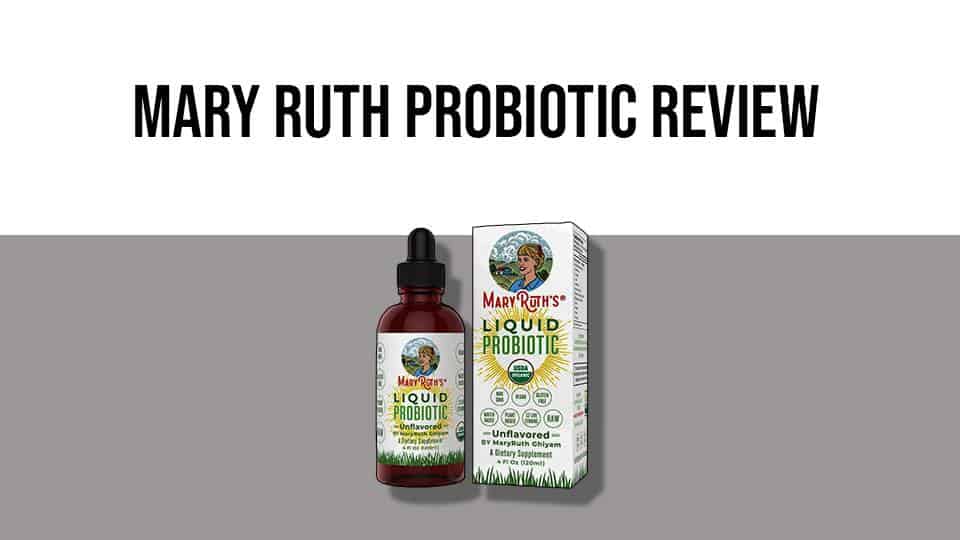
In this Mary Ruths Probiotic Review, I will be sharing my 30-day experience with the liquid probiotic.
I will also be sharing some of the newer probiotic releases and detailing if they are a scam or not.
I will show you the science behind each probiotic strain based on my nutrition training knowledge and share the one strain I thought shouldn't have been added.
I also asked Dr. Enrizza Factor a Dermatologist to review the content in this post.
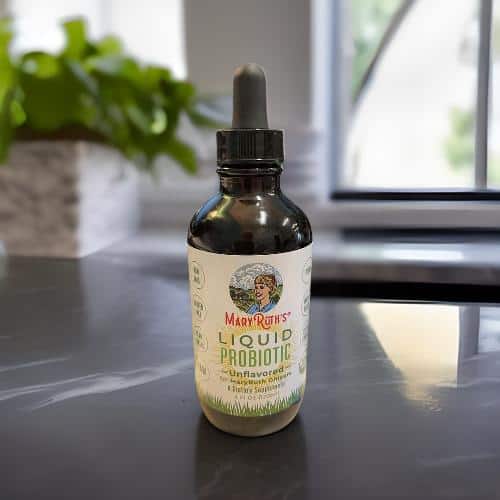
Who is Mary Ruth?

Mary Ruth In 2014
Mary Ruth Organics is a Los Angeles-based company founded by someone called MaryRuth Ghiyam located at 1171 S Robertson Blvd #148, Los Angeles, CA 90035. You can call them at 310-955-1353 or email them at [email protected].
Whilst starting Mary Ruth Organics, she worked as a nutritionist in New York City, and in a Foundr podcast, she claimed that she was at the time, 700k USD in debt but was able to eventually recover from this.
Today she has over 400,000 followers on her Instagram & is said to have a personal net worth of over 100 million US dollars, allowing her to purchase a 26.3 million dollar mansion in 2021.
This review is about my experience with the liquid probiotic which was the first probiotic Mary Ruth released and in my opinion the best. However, I will still share some insight into their newer probiotic offerings and explain if they can help with gut health or not.
In recent years, Mary Ruth's has expanded the probiotic range from just a liquid dropper to a whole range of probiotic supplements that include the following:
With so many probiotic choices on offer, it can be confusing to figure out which one is ideal for your specific situation. Taking a look at other people's personal experiences can help give a clearer picture. This is my own personal experience of taking the liquid probiotic dropper for 30-days and my quick takeaways but yours may not be the same.
My Experience With Mary Ruth's Liquid Probiotic
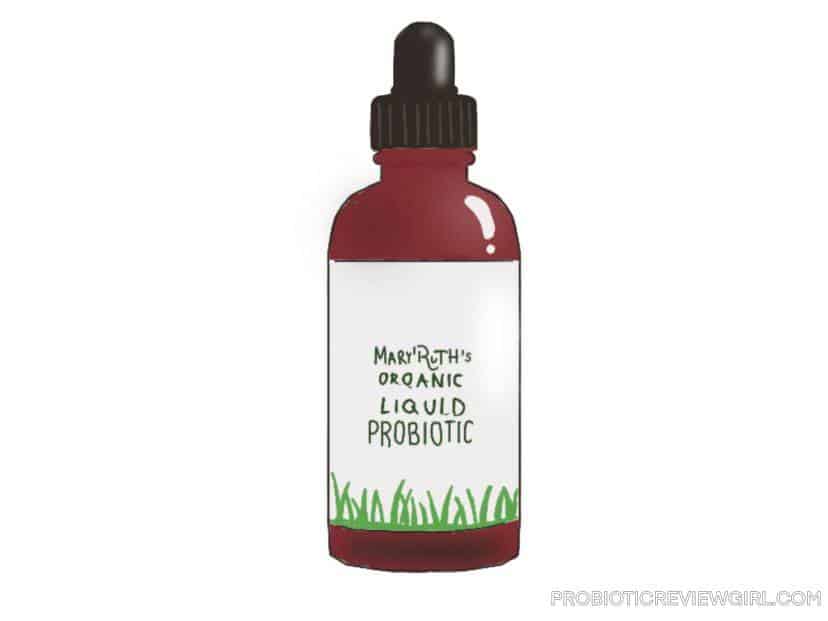
I took one or two drops of the liquid probiotic three times a day. The first drop was first thing in the morning, on an empty stomach before I had my breakfast. I did this for a whole 30-days.
The second time, I dropped some directly into my afternoon coffee, which masked the taste (which, to be honest, is perfectly tolerable anyway). The final drop of the day was the last time at night before bed.
I noticed that after around two weeks, my stomach noticeably settled - with a significant reduction in stomach pain and bloating!
I also noticed my bowel movements starting to become more regular and less unpredictable.
These effects continued until the end of the month, and I am going to be ordering another of the same product to hopefully continue to feel the benefits.
The reduction of unpleasant physical symptoms meant that I was able to be more social and more relaxed when in social situations, without having to worry about discomfort, embarrassing dashes to the bathroom, or wondering which food/drink choices in the restaurant or at the bar might set off my IBS symptoms.
Mary Ruth's Ingredients
Mary Ruth’s Liquid Probiotic contains the following 12 probiotic strains:
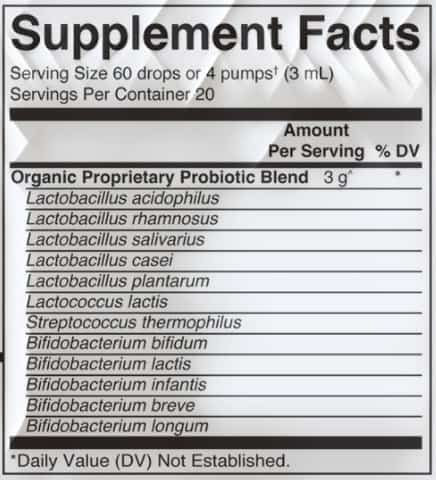
The 2022 ingredients also list alfalfa grass which is typically used as a source of food for livestock like horses but according to WebMD, this grass is also safe for humans to take and may have various health benefits. It hasn't been medically studied for gut health though and is not a probiotic or prebiotic.
The liquid dropper also contains water which makes this liquid probiotic packed with good bacteria and free from gluten, wheat, plant based, nut free, dairy free, soy free, sugar free, NON-GMO, and USDA organic. It also contains no calories making it a healthy choice for those on fasting diets like keto.
Each full spray gives you a 625,000 CFU count which suggests you need quite a few drops to get a good dose of colony-forming unit which is a measurement for the potency of a probiotic. For the adult liquid probiotic you can take up to 5 drops per day and this is also the same dosage for the infant/pet liquid probiotic drops from Mary Ruth's.
Lactobacillus Acidophilus
In 2020, a team of researchers from the Therapeutic Advances in Gastroenterology published a journal on the effects L. Acidophilus could have on digestive disorders.
In it, they first claimed that dysbiosis an imbalance between good & bad gut bacteria had been associated with diseases like IBD, Chrons, and Ulcerative Colitis.
In the conclusion of this journal it was found, there was "enough evidence to show L. Acidophilus was safe & effective" for the treatment of acute & chronic diarrhea but stopped at endorsing its benefits for any other type of digestive disorder.
The strain was however strong enough to survive the hostile environment of the digestive system and may crowd out bad bacteria in the microbiome.
Lactobacillus Rhamnosus
Lactobacillus Rhamnosus GG is one of the most studied strains out there and is included as a single ingredient in a popular probiotic supplement from Culturelle.
Whilst the strain listed in the ingredients of Mary Ruth Liquid Probiotic is just L. Rhamnosus and not L. Rhamnosus GG the two both have genomes that are virtually identical which is good news.
According to "Thirty Years of Lactobacillus rhamnosus GG" published in the Journal of Clinical Gastroenterology, this short Gram-positive strain was one of the first to be patented in 1989 after first being isolated in 1983.
The review stated this strain can survive high gastric acid pH, protect the mucosa in the gut, protect against bad salmonella bacteria, help with C. Diff or Antibiotic-related diarrhea, assist with IBS, IBD, some allergies, and more.
Lactobacillus Salivarius
Lactobacillus Salivarius is a type of bacteria that can be found in both the digestive tract and interestingly in the saliva making it a popular choice for those with oral-related issues. It has also however been studied for Eczema, Inflammation, Infections, IBS, and also diverticulitis. Not all of the studies however provided sure-fire conclusions.
One of the better clinical trials published in 2014 in BMC Oral Health looked at the effects of L. Salivarius in tablet form. 64 participants took the L. Salivarius tablets for 2-weeks and the conclusion of the trial was that the tablets were able to "increase resistance to caries risk factors." It's unclear however if the strain in Mary Ruth's liquid dropper could provide the same effects or not.
Lactobacillus Casei
Studies on the Lactobacillus casei probiotic strain are somewhat limited but we do know that it has acid-tolerance, is non-spore forming, and is of course a good type of probiotic bacteria.
One 2017 study published in the Archives of Medical Science showed benefits for colic in infants versus a placebo. L. Casei is however not included as a strain in Mary Ruth's Infant Liquid Probiotic and the liquid adult dropper should not be taken by kids or infants.
Lactobacillus Plantarum
Lactobacillus Plantarum is a well-studied bacteria that can be found in fermented vegan dishes such as Kimchi, Sauerkraut, and non-vegan drinks like Kefir Milk.
One excellent study carried out on Zebra Fish found that serotonin transporter expression were increased and anxiety behavior was reduced.
It may also help with bloating and abdominal pain because of its effects on the mucosal membrane according to the World Journal of Gastroenterology.
Lactococcus Lactis
Lactococcus Lactis is an important lactic acid that has been used in cheese production for many years. It helps with the fermentation process by increasing the speed that dairy ferments and adds to the unique flavor.
It's different from the other Lactobacillus strains already listed in that it does not colonize the gastrointestinal tract of humans. Its benefits are said to come from its potential for the delivery of functional proteins.
One 2010 study found that L. Lactis may be able to trigger mucosal immunity but the study was carried out in mice and in vitro. It's a strange choice for Mary Ruth's Liquid Probiotic and I don't think it should have been added in with better probiotic strains she could have chosen but its effects on adaptive immune responses do look promising.
Streptococcus Thermophilus
Streptococcus Thermophilus a gram-positive bacterium can be found in raw milk that can be found in the gut and a 2020 study showed that after yogurt consumption the bacteria was found in human feces suggesting that it does have an ability to survive the harsh conditions of the gastrointestinal tract.
Once reaching the intestines, its effects are a little less known currently in 2022 but this study found that S. Thermophilus may help with digestion of lactose, have antioxidant activities, modulate intestinal microbiota, and help protect against some types of bad bacteria or pathogens. It's another strange choice from Mary Ruth with so many other better-studied strains out there.
Bifidobacterium Bifidum
This 2014 journal published in Applied and Environmental Microbiology looked at the effects of B. Bifidum on Immune response and found that the probiotic bacteria was able to have an immunomodulatory effect in vitro and mice models.
It showed that white blood cells were produced to fight infection and that Bifidobacterium Bifidum was able to stimulate HT29 cells which had an anti-inflammatory effect in the gut. Further clinical trials are needed to ascertain these findings.
Bifidobacterium Lactis
The benefits are not yet totally known due to a lack of studies but outliers like this one showed that compared to other bifidobacteria it had a "gastric acid & bile" tolerance.
It is also found to be effective against pathogens like C. Diff, Salmonella, Listeria, and more but keep note that this was found in vitro and not in humans. More studies on B. Lactis are needed and many of the potential uses are still unknown.
Bifidobacterium Infantis
The name Bifidobacterium Infantis comes from its association with infants since it is commonly found in the digestive tracts of babies colonizing there for up to one year.
It was once found to be more common in breastfed babies but this alarmingly has shown to no longer always be the case in western industrialized countries.
This strain can also be found in Mary Ruth's infant liquid probiotic but Adults can also make use of the potential benefits of this strain.
The B. Infantis strain was shown in this excellent 2020 journal to produce short chain fatty acids like acetate which can be useful for things like Leaky Gut.
This is by directly binding to intestinal cells, inhibiting pro-inflammatory cytokine in the intestine, and stimulating the growth of butyrate-producing microbe.
This is one of the best strains in Mary Ruth's liquid probiotic because of its potential to reduce inflammation.
Bifidobacterium Breve
In 2018 a randomized clinical, double-blind, placebo controlled trial in the Bioscience of Microbiota, Food and Health looked at the body fat reductions in 80 pre-obese adults In Tokyo, Japan.
They took two 20-billion CFU capsules per day for 2-weeks with the placebo group taking a capsule containing corn starch.
It was found that in the group taking this strain for 12 weeks, a significant reducing effect on body fat was found.
Interestingly, however, this probiotic strain is not included in Mary Ruth's Weight Management capsules with 3 lactobacillus strains, Garcinia cambogia extract powder, Morosil, and green tea extract used instead.
Bifidobacterium Longum
In 2017 we were blessed with this high-quality randomized controlled study looking at the effects of Bifidobacterium Longum on depression and brain activity in 44 adult patients with Irritable Bowel Syndrome.
Half were given B. Longum with others a placebo and at 6 weeks 14 out of 22 in the probiotic group had lower depression scores with only 7 in the placebo group reporting lower depression scores but not anxiety scores.
These findings were also tied associated with cognitive brain patterns that showed lower limbic activity. It's unclear what CFU count was given and for how long so we don't know if Mary Ruth's liquid probiotic could also have this same effect. A larger sample size of participants could also have provided a clearer result.
Mary Ruth’s Liquid Probiotic Reviews
As well as doing my own tests, I decided to check out some of the reviews of this probiotic on Amazon to see what other customers thought.
Although some users mentioned side effects such as an initial increase in bowel movements in the first couple of weeks (which is common with most probiotics).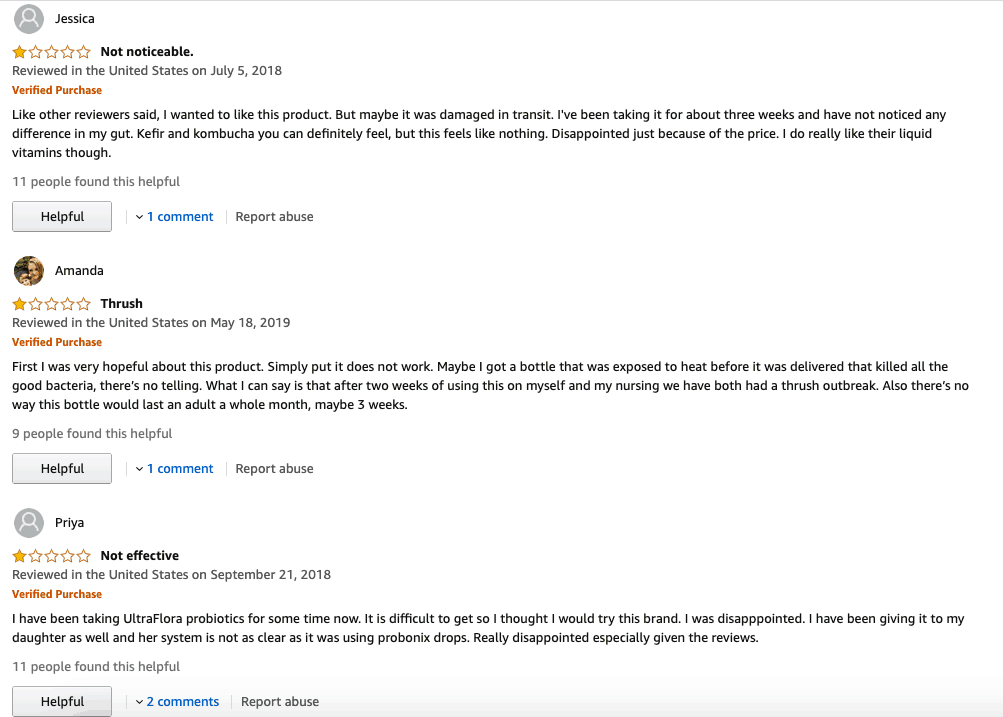
Customers rated the product highly (it currently has a four-and-a-half-star overall rating) and claimed that in comparison to many other probiotic products, it was extremely effective in combating the symptoms from digestive issues like acid reflux to IBS.
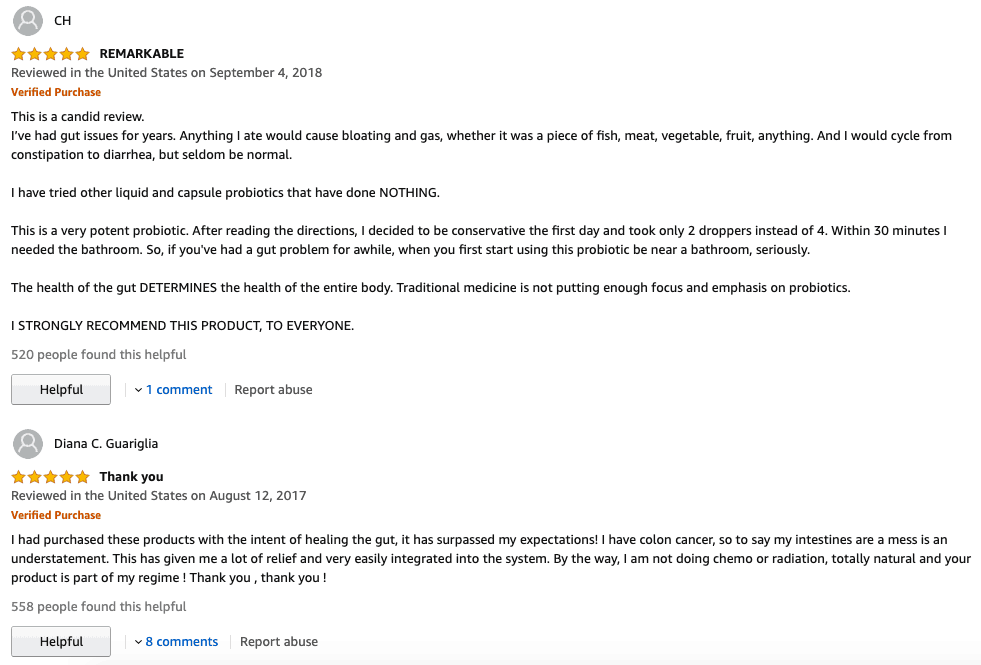
Mary Ruth's Probiotic Recall
On October 29th, 2021 Mary Ruth Organics publicly announced a recall of all of its Infant Probiotic's warning customers with affect lot numbers to throw away the probiotic supplement. This was due to the risk of infection from Pseudomonas aeruginosa or Pseudomonas aeruginosa which are types of bad bacteria.
This was discovered after routine laboratory testing found an issue. No serious incidents were reported and no other Mary Ruth recalls have since been reported. Some other brands don't even do routine lab tests so the fact that Mary Ruth's voluntary did this recall is a good sign in my eyes and shows they are always making sure that no harm comes to their customers.
Mary Ruth Vs Other Probiotics?
It's difficult to compare Mary Ruth's with other liquid probiotic supplements because there simply aren't many others for sale but there are some alternatives.
One of them is Kefir milk which is a dairy-based product made from fermenting cow's milk which contains a wider variety of strains of bacteria and yeasts, compared to Mary Ruth's which has more limited probiotic strains.
When trying Garden Of Life a capsule probiotic before I personally found Garden of Life to provide better results for my IBS issues. I found the capsules to be stronger than the liquid in Mary Ruth's but I still think kefir is the ultimate winner and also cheaper.
Final Thoughts
It's clear that Mary Ruth's is one of the most trusted supplement brands in the west and that great care is taken from the formulation of their products to the latter customer support.
Whilst the studies shared for the probiotic strains in the liquid probiotic promise the CFU counts are likely to be far lower than what Mary Ruth's offers.
It's not clear if you will get the same health results and you should never use their probiotics as a replacement for any prescribed treatment. Also, consult with your doctor first for any health issues. For full disclosure, I am not a Doctor!
If you prefer capsule probiotics, Complete Gut Health+ from Mary Ruth's looks promising but once again the CFU count is frustratingly not listed on the sales page. Their spray also look interesting but has no CFU count.
I had a good experience with Mary Ruth's liquid probiotic and the good thing is that you can take more drops to get a higher CFU count. Unlike capsules, you don't notice it as much with it being a small amount of liquid.
Overall I would give the liquid product a 4 out of 5-star rating because I had a good experience but at a cost of $44.95 on the official website it's not the cheapest and I felt some different strains could have been added instead.
Probiotic Review Girl's Recommendation
You might think I'm crazy...
Most probiotic supplements suck.
I know this from experience. Since launching Probiotic Review Girl in 2019, I bought and tested over 27 different probiotic brands.
I got burned so many times that I eventually did something "crazy"...
At the end of 2021, I launched my own probiotic supplement.
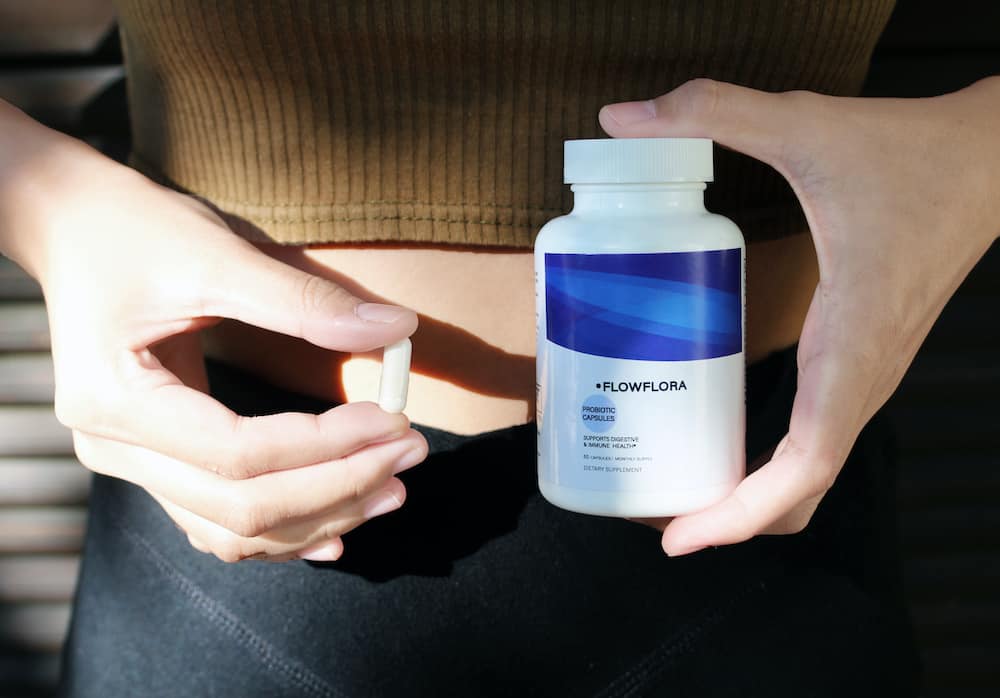
No more stressing about low cfu counts and wether or not the probiotic capsule will survive my stomach acid. I finally have a probiotic supplement I KNOW will work the way I want it too.
I use it everyday after years of battling Irritable Bowel Syndrome (IBS), I now have my energy and social life back!
The positive news? I have made my probiotic supplement available to Probiotic Review Girl readers and you can experience the gut health benefits yourself.
Use coupon code "ALICIA" for 15% off at checkout.

Alicia Harper is a NASM-CNC Certified nutritionist and the editor of ProbioticReviewGirl.
After suffering from recurrent gut issues she spent years researching Probiotics and the microbiome.
She has tested 29+ different Probiotics and is a probiotics expert. As a probiotic fanatic, she has valuable knowledge to share with the world.